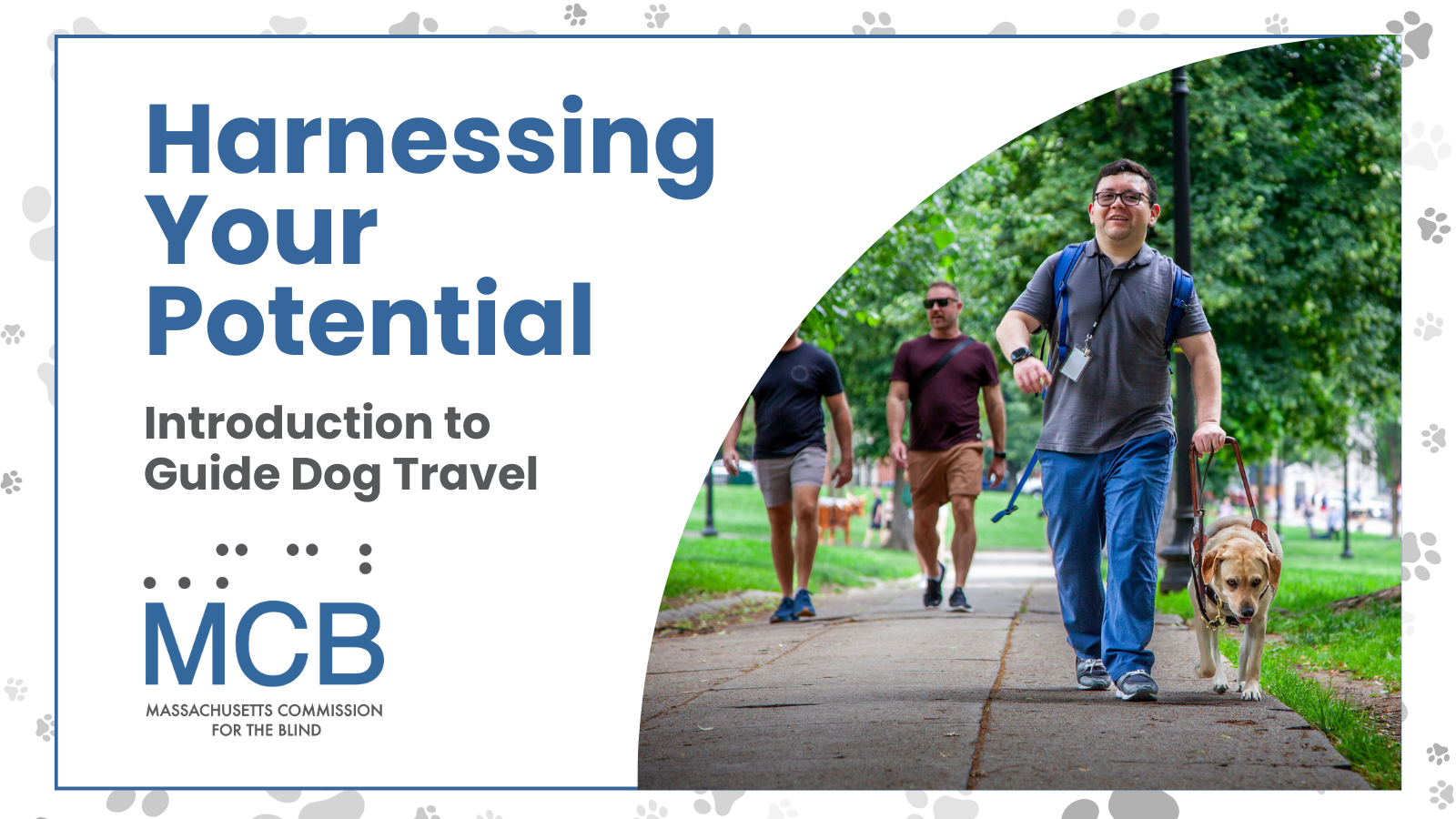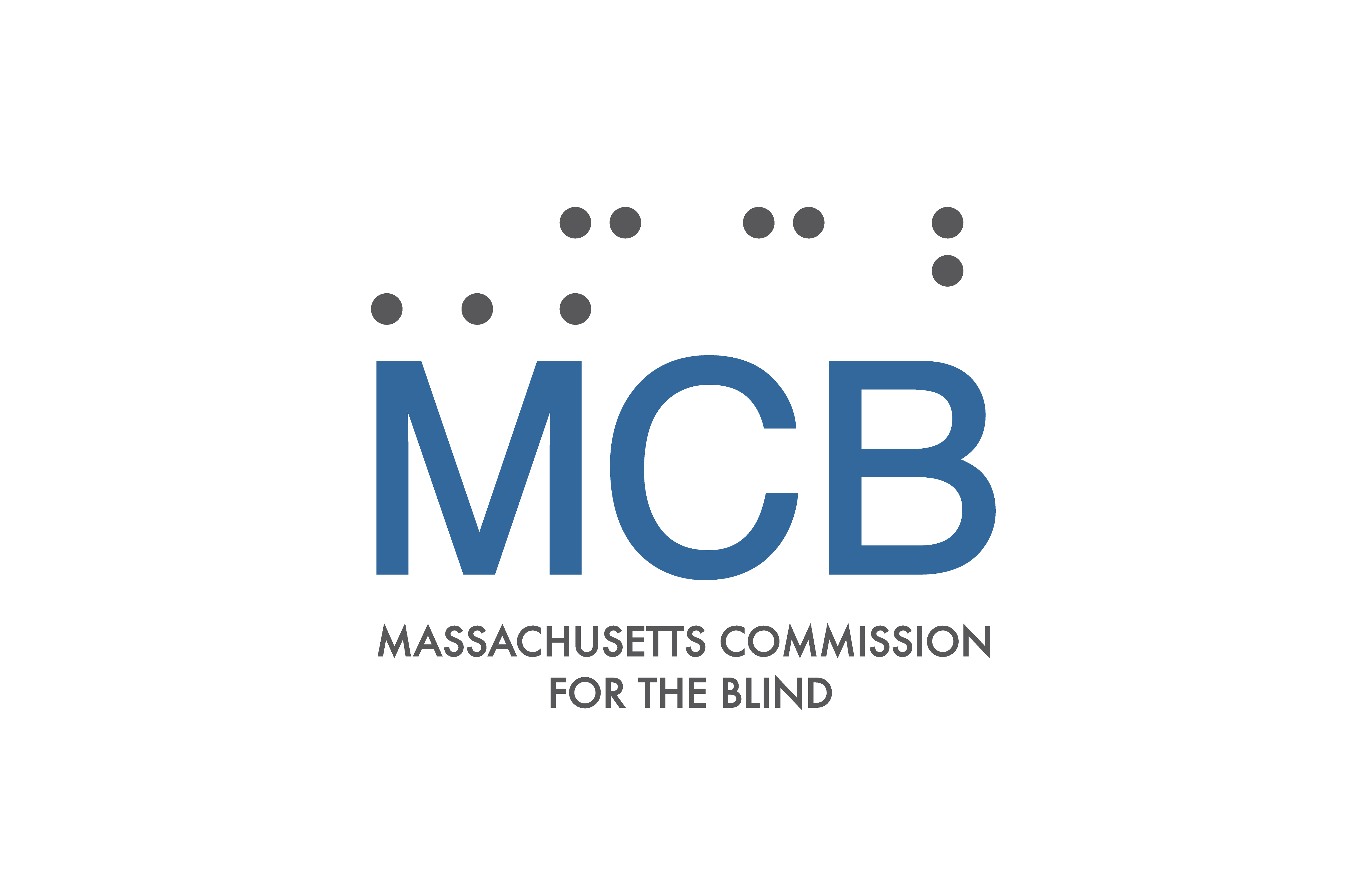- Massachusetts Commission for the Blind

Video: Harnessing Your Potential: An Introduction to Guide Dog Travel
Skip this video Harnessing Your Potential: An Introduction to Guide Dog Travel.Boston — When Lisa Judelson steps out with her guide dog, Iron, she knows two things will happen. First, she’ll walk with confidence, navigating sidewalks and obstacles with purpose. Second, people will approach her about her dog. All day. Everywhere.
“It’s always interesting for my friends when they’re with me,” Lisa shared during the Massachusetts Commission for the Blind’s Harnessing Your Potential: An Introduction to Guide Dog Travel webinar, held on April 25. “They’re like, ‘Wow, everyone wants to talk about him.’ And I say, ‘Yes, all day. This is what happens.’”
Lisa, along with fellow guide dog handler Lina Coral, shared their stories during the webinar - an event designed to highlight MCB's role in supporting consumers who want to be paired with a guide dog.
Laying the Groundwork
As Ally Bull, Director of Orientation and Mobility at MCB, explained during the session, MCB’s role is crucial but often misunderstood.
“We don’t train or place guide dogs,” Ally clarified. “What we do is help people build the foundation they need to be successful guide dog handlers.”
MCB’s team of Certified Orientation and Mobility Specialists (COMS) works with consumers across Massachusetts, helping them develop the independent travel skills required before applying to a guide dog program. Services focus on safe, efficient travel in an individual’s home, workplace, and community, always tailored to each person’s goals.
“We’re the prep team,” Ally said. “We help people develop the skills needed to apply to guide dog schools, and we continue supporting them after placement.”
Enter the Experts
The webinar also featured insights from Jane Flower, Youth Outreach Specialist and guide dog user, and Megan Dameron, Senior Outreach and Admissions Specialist, at Guide Dogs for the Blind (GDB).
Jane, who is working with her third guide dog, shared, “You don’t just show up and get a dog. You need to be ready - physically, emotionally, and logistically.”
Megan walked participants through GDB’s admissions process, stressing the importance of independent travel with a long white cane before applying. “If most of your travel during the day doesn’t involve a cane, you wouldn’t be getting the full benefit of a guide dog,” Megan said.
Both Jane and Megan emphasized that guide dog schools like GDB match dogs with handlers who already have strong travel and mobility skills - skills often developed with support from agencies like MCB.
Real Stories, Real Impact
The heart of the webinar came through the personal stories of Lisa and Lina. Lisa shared her adjustment to cane travel after losing her vision and how she eventually decided to pursue a guide dog: “I didn’t enjoy using my white cane initially, and I thought, ‘Oh, I’ll get a guide dog!’ But I quickly realized that’s not how it works.”
She credited her orientation and mobility training with preparing her for life and for a guide dog: “I’m so grateful for that. I wouldn’t be a good guide dog handler without it.”
Lina, who trained with Fidelco Guide Dog Foundation, spoke about her guide dog, Quest, who guided her through college and graduate school. “Quest was a huge help for me socially, especially when meeting new people,” Lina said.
She also shared the emotional complexities of guide dog partnerships: “Sometimes it doesn’t work out. It’s not anyone’s fault. It’s just how it goes.”
Both Lisa and Lina made clear that while a guide dog offers freedom and companionship, being a handler requires dedication, consistent practice, and respect for the dog’s needs.
Rights, Responsibilities, and Respect
Susanne Agerbak, Disability Rights Information Specialist at the Massachusetts Office on Disability, wrapped up the session with an important reminder about the rights and responsibilities of service dog handlers.
“The laws place you in a strong position to take a well-behaved service dog most places,” Susanne said. “But there are important exceptions and complications in some contexts that you need to be aware of.”
She also noted that negative experiences with untrained dogs can create barriers for well-trained guide dog teams, underscoring the importance of understanding both your rights and responsibilities as a handler.
Walking Alongside
The Harnessing Your Potential webinar reinforced one key point: MCB doesn’t place guide dogs, but we help individuals who are legally blind build the skills, confidence, and community connections they need to succeed.
“We’re part of the journey,” Ally said. “We may not provide the dog, but we make sure the person is ready. And for many of our consumers, that’s the difference between wondering if they can do it - and knowing they can.”
Interested in Learning More?
For more information, visit mass.gov/guidedogs or contact MCB at 1-800-392-6450 or mcbinfo@mass.gov.
Contact Jane Flower, Youth Outreach Specialist, Guide Dogs for the Blind at 415-492-4176 or jflower@guidedogs.com.
Contact the Massachusetts Office on Disability
Additional Resources
Harnessing Your Potential: An Introduction to Guide Dog Travel
Guide Dogs for the Blind: Guide Dog Self Screening
Guide Dogs for the Blind: K9 Buddy Program
Guide Dogs for the Blind: Orientation & Mobility Immersion Program
Guide Dogs for the Blind: Resources for Blindness Professionals
Massachusetts Office on Disability: Brief Overview of Disability Rights for Service Dog Owners
